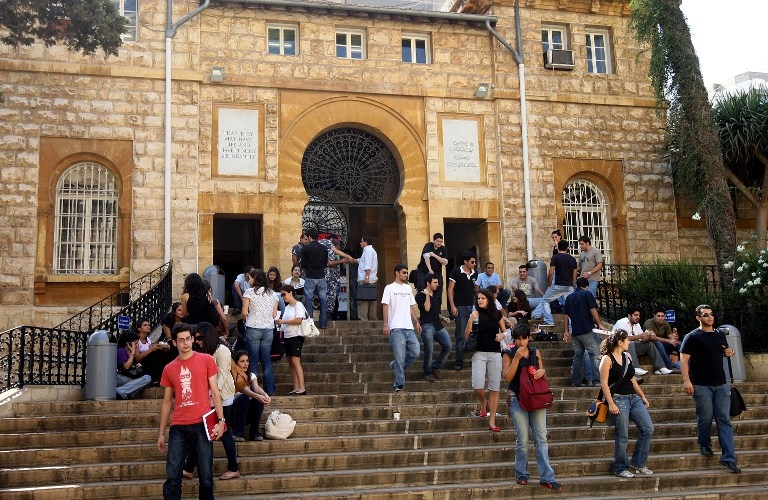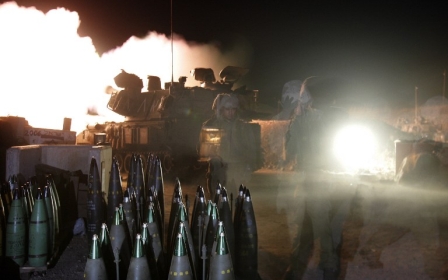Non-crime and punishment at the American University of Beirut

On 24 March, Reuters reported an announcement by US federal prosecutors that the American University of Beirut (AUB) had agreed to pay $700,000 to the US government for allegedly assisting three entities linked to Hezbollah.
The photograph of the AUB entrance that accompanies the article on the Reuters website initially came equipped with a caption explaining that this was "where Dean Kevlin, an American senior member of staff, went missing on Thursday".
In short, all sorts of alarming news - until the powers that be at Reuters realised that the Kevlin in question had in fact disappeared (briefly) in 2001, after which the caption was amended accordingly.
Notorious Islamophobe Daniel Pipes meanwhile chimed in with a nanny-nanny-boo-boo on Twitter: "[AUB] has long coddled extremists. Now, this cost it a pretty $700K fine."
What, then, was this Very Important Crime committed by the university?
Who's getting coddled here?
According to a press release on the website of the US Department of Justice, AUB's alleged transgressions involved "providing material support" - on different occasions between 2007 and 2009 - to al Nour Radio, al Manar TV, and the NGO Jihad al-Binaa.
The AUB penalty certainly won't cause the US to rethink its militant opposition to academic penalties that occur in the context of the Boycott, Divestment and Sanctions movement
In December 2007, for example, a training workshop titled Citizen/Online Journalism was held at AUB and "consisted of two internet and news media experts providing training to the attendees – one of whom was from al Nour Radio – on various topics, including the creation of online blogs; photo, audio and video editing and production; linking to other websites; podcasting; packaging stories for multimedia and different platforms; and presentation of final products".
In other words, Terrorism 101.
Furthermore, the press release notes, AUB had the audacity to "allow ... Jihad al-Binaa to be included in the NGO database" - which would seem to be a good place for NGOs.
Incidentally, Jihad al-Binaa played a vital role in reconstruction efforts in Lebanon after the Israeli military destroyed much of the country in the war of 2006.
Which brings us to the following question: why should AUB be saddled with a fine of nearly three-quarters of a million dollars for a smattering of workshops and a database entry that existed a decade ago, while the US finds it perfectly ethical to continue flinging billions of dollars annually at Israel?
The latter entity, of course, uses the funds for much more nefarious activities than explorations of the art of podcasting. Regular massacres of Arab civilians come to mind.
Meanwhile, the AUB penalty certainly won't cause the US to rethink its militant opposition to academic penalties that occur in the context of the Boycott, Divestment and Sanctions (BDS) movement in pursuit of Palestinian rights.
The BDS website defends its call for an academic boycott of "complicit Israeli academic institutions" by pointing out the involvement of Israeli universities in "developing weapon systems and military doctrines" for Israel's army as well as "justifying the ongoing colonisation of Palestinian land [and] rationalising gradual ethnic cleansing of indigenous Palestinians".
Did someone say "coddling extremists”?
Not about aid
But back to the AUB fine. It's worth contemplating the US government's primary argument in favour of the university's guilt, which is that the alleged transgressions took place even as AUB was accepting money from the US Agency for International Development (USAID).
USAID's humanitarian veneer conceals a deeper mission to cajole the earth's population into behavioural patterns that cater to the needs of American capital
As the Department of Justice press release explains, to gain funding USAID demands that you shouldn't be "providing material support" to any entities "included on the US Office of Foreign Assets Control's ('OFAC') Specially Designated Nationals and Blocked Persons List (the 'SDN List')".
For the sake of continuing the acronym game, let's bring up the fact that USAID has in its numerous dealings throughout the world performed functions eerily reminiscent of those of another acronym - the CIA - particularly in terms of attempts at political disruption in Latin America.
Of course, USAID has refrained from waging covert war on Laos or killing more than 80 bystanders in a failed assassination scheme in Beirut - events that do belong on the other acronym's CV but that naturally haven't landed the organisation on any "SDN List".
For its part, USAID's humanitarian veneer conceals a deeper mission to cajole the earth's population into behavioural patterns that cater to the needs of American capital.
As Cornell University’'s Max Ajl remarked last year in a speech at AUB about Tunisian agriculture: "USAID is not and has never been about aid." The speech took place as part of an AUB-hosted conference titled Fragments of Empire.
Don't anyone tell the justice department.
Empire knows best
As for the potential fallout of the new $700,000 castigation, Acting US Attorney for Manhattan Joon H Kim is quoted in the press release as announcing that AUB has "admitted to its conduct and agreed to put proper precautions in place to ensure that it does not happen again".
The neurotic reach of the US has already had a chilling effect on various aspects of day-to-day existence in Lebanon
Never mind the ideals of freedom and sanity - or the fact that Hezbollah happens to be an integral part of the Lebanese landscape, with plenty of adherents among AUB's student body. As usual, the Empire knows best.
It's not clear just how many imposed "precautions" the educational institution will ultimately be willing to accept. But as an AUB alumnus now working as a consultant in Beirut recently commented to me, the neurotic reach of the US has already had a chilling effect on various aspects of day-to-day existence in Lebanon.
To illustrate his point, he brought up the example of international organisations operating in the country with US funding. The ability of these groups to properly attend to the needs of refugees and other disadvantaged communities is, he said, already restricted by the ever more imperative need to not be seen as cooperating to even the itsy-bitsiest extent with Hezbollah.
In this way, too, "aid" is not really about aid.
But, hey, who cares. The US government is now $700,000 richer. And just as that money didn't come from a just cause, it's unlikely to go to one.
- Belen Fernandez is the author of The Imperial Messenger: Thomas Friedman at Work, published by Verso. She is a contributing editor at Jacobin magazine.
The views expressed in this article belong to the author and do not necessarily reflect the editorial policy of Middle East Eye.
Photo: Lebanese students of the American University in Beirut (AUB) gather on the steps of their university campus in October 2007 (AFP)
Middle East Eye propose une couverture et une analyse indépendantes et incomparables du Moyen-Orient, de l’Afrique du Nord et d’autres régions du monde. Pour en savoir plus sur la reprise de ce contenu et les frais qui s’appliquent, veuillez remplir ce formulaire [en anglais]. Pour en savoir plus sur MEE, cliquez ici [en anglais].





